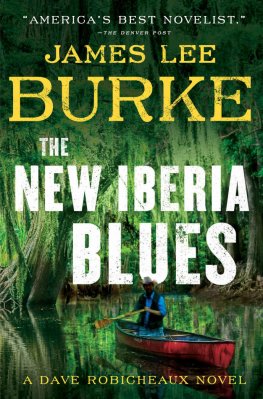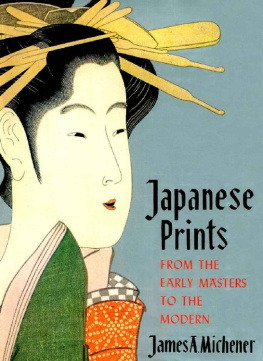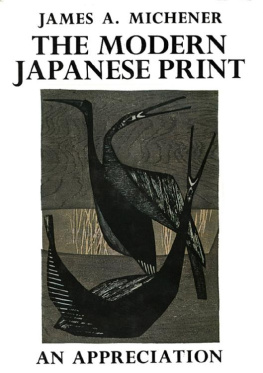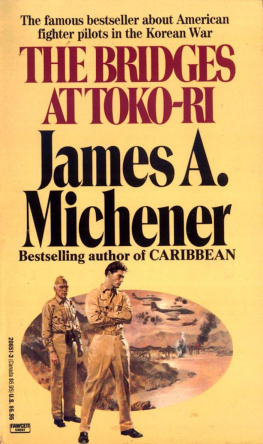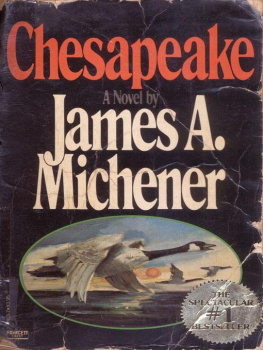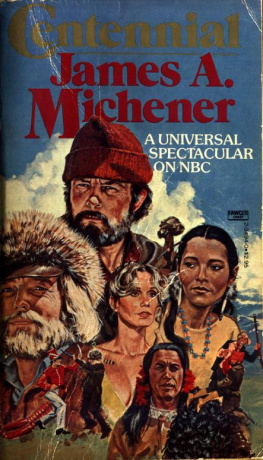James Michener - Iberia: Spanish Travels and Reflections
Here you can read online James Michener - Iberia: Spanish Travels and Reflections full text of the book (entire story) in english for free. Download pdf and epub, get meaning, cover and reviews about this ebook. year: 1968, publisher: Random House, NY, 1968, genre: Detective and thriller. Description of the work, (preface) as well as reviews are available. Best literature library LitArk.com created for fans of good reading and offers a wide selection of genres:
Romance novel
Science fiction
Adventure
Detective
Science
History
Home and family
Prose
Art
Politics
Computer
Non-fiction
Religion
Business
Children
Humor
Choose a favorite category and find really read worthwhile books. Enjoy immersion in the world of imagination, feel the emotions of the characters or learn something new for yourself, make an fascinating discovery.

- Book:Iberia: Spanish Travels and Reflections
- Author:
- Publisher:Random House, NY, 1968
- Genre:
- Year:1968
- Rating:3 / 5
- Favourites:Add to favourites
- Your mark:
- 60
- 1
- 2
- 3
- 4
- 5
Iberia: Spanish Travels and Reflections: summary, description and annotation
We offer to read an annotation, description, summary or preface (depends on what the author of the book "Iberia: Spanish Travels and Reflections" wrote himself). If you haven't found the necessary information about the book — write in the comments, we will try to find it.
Iberia: Spanish Travels and Reflections — read online for free the complete book (whole text) full work
Below is the text of the book, divided by pages. System saving the place of the last page read, allows you to conveniently read the book "Iberia: Spanish Travels and Reflections" online for free, without having to search again every time where you left off. Put a bookmark, and you can go to the page where you finished reading at any time.
Font size:
Interval:
Bookmark:
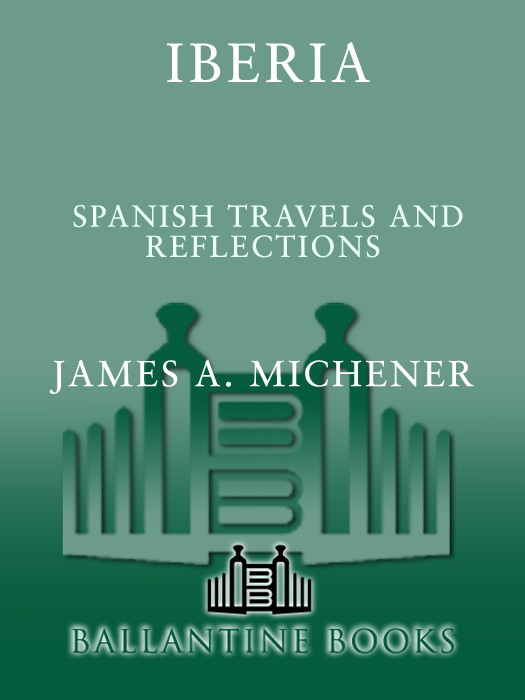
THIS BOOK WILL MAKE YOU FALL IN love with Spain. Michener writes with a delightful sense of continuing discovery and curiosity, and a sustaining affection for his subject. kaleidoscopic. Micheners account of Spain is both satisfying and convincing.
The Houston Post
VINTAGE MICHENER CLASSIC SPAIN Michener has captured the Spanish character in print as surely as Vavra has done it on film.
St. Louis Globe-Democrat
A BOOK TO KEEP AND TREASURE.
San Francisco Examiner
MASSIVE, BEAUTIFUL. Unquestionably some of the best writing on Spain the best that Mr. Michener has ever done on any subject. the ideal companion. stunning. memorable.
The Wall Street Journal
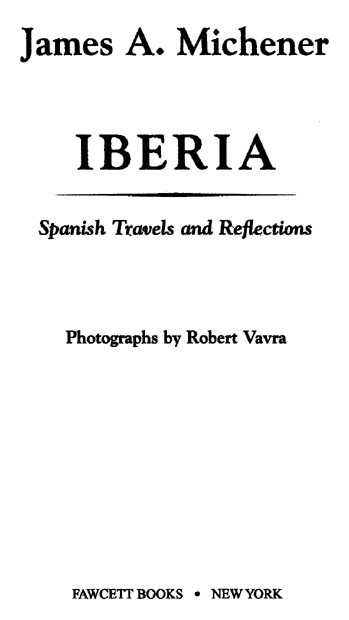
A Fawcett Book
Published by The Random House Publishing Group
Copyright 1968 by Random House, Inc.
All rights reserved, including the right to reproduce this book or portions thereof in any form under the International and Pan-American Copyright Conventions. Published in the United States by Ballantine Books, an imprint of The Random House Publishing Group, a division of Random House, Inc., New York, and simultaneously in Canada by Random House of Canada Limited, Toronto.
Fawcett is a registered trademark and the Fawcett colophon is a trademark of Random House, Inc.
www.ballantinebooks.com
eISBN: 978-0-307-83416-4
Maps by Jean Paul Tremblay
A Selection of the Book-of-the-Month Club, July 1968
v3.1

I have long believed that any man interested in either the mystic or the romantic aspects of life must sooner or later define his attitude concerning Spain. For just as this forbidding peninsula physically juts into the Atlantic and stands isolated, so philosophically the concept of Spain intrudes into the imagination, creating effects and raising questions unlike those evoked by other nations. During the four decades that I have traveled in Spain I have always wanted to describe the impact this vibrant land has had upon me, and now I have an opportunity to do so.
Did any traveler ever enter Spain in a more appropriate manner than I? While a student in Scotland, I had shipped as chart boy aboard a Clydeside freighter which lugged coal to Italy and brought back oranges from Spain to be used in the marmalade factories of Dundee. We sailed from Glasgow, buried in coal dust, as ugly a little tramp steamer as ever skirted the Bay of Biscay. Against headwinds we made only ninety-six miles a day, pitching and tossing the while, so that I was well fed up with the trip before we ever saw land. Then out of the Atlantic we spotted Cabo Finisterre off the port bow, and for much of one stormy day we kept it in view, a tantalizing taste of Spain, solid, dark, mysterious, looming out of the gray waves.
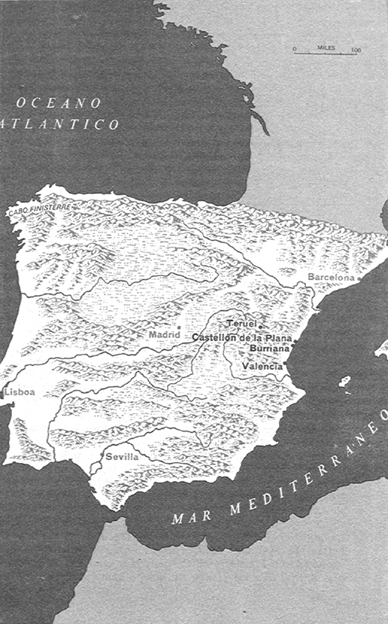
As our freighter rose and fell in the troughs this glimpse of land began to haunt me. More than anything else in the world I wanted to see the Spain of which Finisterre formed the western rampart. Past this point three and a half centuries ago Sir Francis Drake had come to harry Spanish shipping and to burn Spanish ports. Here the Armada had formed for its assault on England, and the headland as I saw it that stormy day was well suited to historic purposes. It was dark, heavy, unlike anything I had previously seen. It was in truth lands end, the western promontory of the European continent, and it challenged the mind.
Well, we left Finisterre and plowed our way monotonously south, and a long time later, when I had grown accustomed to the pitching of our uncomfortable freighter, we steamed into the Straits of Gibraltar and I saw, again to port, the sun-drenched uplands of Algeciras, and they were so different from what I had seen in the storm off Finisterre, so inviting and so startling in the vividness of their color, that I again felt the urge to flee that ship and go ashore, forgetting Italy, which had been the purpose for making this trip.
But we left Gibraltar behind us, then Mallorca, then Corsica, and finally we emptied our coal at ancient Civitavecchia, that dreariest of all Italian ports, where Michelangelo had once served as city architect in charge of fortifying the harbor and where Henri Beyle had spent long years as French consul, publishing his reflections under the name of Stendhal. He and Michelangelo distracted me for a while, but often as I traveled over Italy on leave from the coal barge I recalled those two fleeting glimpses of Spain and longed for the day when our empty ship would sail into some distinguished port like Valencia or Barcelona to pick up our oranges. I imagined myself striding ashore to inspect at first hand the greatness which I felt sure existed in that dour land. The captain of the freighter wasnt certain which of the ports we would head for, but trusted Glasgow to advise him by the time we reached Mallorca.
When we were abeam of that island the wireless finally spoke: Castelln de la Plana, and the captain was pleased. Beautiful little city, he said.
I ran to my charts and found that Castelln lay between Barcelona and Valencia, the actual city being some two miles or more inland from the harbor. It was a major port for the shipping of oranges and traditionally the scene of Spains first fair of the year, at which the opening bullfights of the season were held. Castelln is one of the best places in Spain for beginning a visit, the captain assured me.
During the passage from Mallorca to the mainland I memorized the shipping instructions contained in Pilot for the East Coast of Spain and prepared myself spiritually for my entrance to the country by rereading the best passages of Don Quixote. But on the last evening we received a wireless directing us to avoid Castelln de la Plana and to proceed instead to the tiny village of Burriana, where oranges were awaiting us.
Burriana has no harbor! I protested, for the Pilot said: Ships anchor in the roads and prudent ones keep a sharp watch on their lines.
They barge the oranges out to us, the captain explained.
Then we dont land?
No.
My disappointment was so apparent that he added, But you can ride ashore on one of the barges and join us next week in Valencia.
I had rarely heard finer words, and all that night I stayed on deck, waiting to catch my first glimpse of the point at which I would enter Spain, but no lights showed, and finally in the east, over Mallorca, which we had left astern, the sun began to rise and a soft Mediterranean beauty suffused the air.
My first view of Burriana? It wasnt a view. It was a smell, for the offshore breeze carried to our dirty little freighter the odor of orange blossoms, heavy and pungent and inescapably the odor of Spain. Then, in the direction from which this superb aroma came, I saw the low shore begin to rise from the waves and with incredible swiftness present itself. Our ship slowed. The anchor chains went out. Lines were thrown to men in rowboats, who attached them to buoys, and gradually we swung in to the current, ready to receive whatever cargo awaited us.
Font size:
Interval:
Bookmark:
Similar books «Iberia: Spanish Travels and Reflections»
Look at similar books to Iberia: Spanish Travels and Reflections. We have selected literature similar in name and meaning in the hope of providing readers with more options to find new, interesting, not yet read works.
Discussion, reviews of the book Iberia: Spanish Travels and Reflections and just readers' own opinions. Leave your comments, write what you think about the work, its meaning or the main characters. Specify what exactly you liked and what you didn't like, and why you think so.

